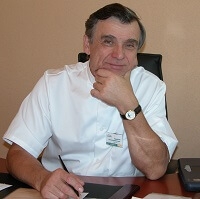When it comes to plastic surgery, or rather its most complex and important section - the reconstructive restoration of the appearance that has suffered as a result of an illness or accident, there can be no routine, familiar, ordinary approaches for a doctor. Every step, every decision is carefully calculated.
About the features of reconstructive surgery - the word to one of the leading plastic surgeons of world renown, the man who stood at the origins of the development of maxillofacial surgery, Doctor of Medical Sciences, Professor, General Director of "ART-Clinics" Alexander Ivanovich Nerobeev.

, plastic surgeon, MD,
Professor, General Director of "ART-Clinic"
When people talk about plastic surgery, they first of all mean rejuvenating surgeries. And what place do reconstructive operations occupy in this section of surgery?
Reconstructive surgery is the backbone of plastic surgeryIn fact, reconstructive surgery is the basis of plastic surgery. Abroad, a doctor can be considered a plastic surgeon only after having worked in this field for 5 or 10 years.
We have a completely different practice: 98% of plastic surgeons enter this profession two years after graduating from medical school, having mastered two to five cosmetic surgeries at best.
Do you often have to deal with the mistakes of colleagues?Permanently. 30% of my work in aesthetic surgery is correcting the work of my colleagues. It is especially sad when, not understanding what they are dealing with, employees of private cosmetic clinics take up oncology and, say, remove a dangerous mole. In such cases, the doctor's mistake can have the most fatal consequences.
If we talk about reconstructive surgery, the situation is even more serious. Here's a recent example for you. A man came to our clinic, whose face was badly damaged in the fire, he went blind. Before coming to us, the poor fellow underwent 100 (!) operations over the course of seven years. And - no effect: he had no nose, he could not chew properly, his mouth did not open well ... Of course, we did not return his sight, but his appearance was significantly improved.
Which operations do you consider the most difficult?Everything. On the face there are no ordinary operations. Here everything is in plain sight, you can’t cover your face with clothes. Therefore, each such operation is carefully calculated. This, as well as the preoperative examination, takes more than 50% of the time allotted for treatment.
Are there many innovations in maxillofacial surgery?Very! We have access to technologies that we could not have dreamed of 20 years ago: from computer virtual simulation of operations to operating microscopes, microsurgical instruments, which made it possible to operate on structures with a diameter of less than 1 mm!
No less significant are the achievements of the scientific plan. We are very proud that we have learned to develop and successfully implement new methods of moving the patient's own tissues to the place of the lost ones with the immediate restoration of their blood circulation. Now we can do everything. For example, take a bone from a leg and form a lower jaw out of it. Or restore the facial nerve that suffered after a stroke, trauma, or surgery to remove an oncological tumor of the face, neck.
Is it true that you were one of the first to perform reconstructive surgeries on cancer patients?At first I was scolded for it. After all, there used to be a completely different trend: to remove the tumor and not touch the person for three years. I raised the question of the quality of life of these patients. After all, when a person is operated on for cancer, sometimes a lot of tissues are removed: tongue, lip, nose ... The patient remains alive, but how does he live?! In fact, he becomes a social cripple.
Fortunately, I was heard. They began to let me into oncology clinics, where, after the local surgeons removed the tissues affected by the tumor, I immediately began to restore them. I also performed many reconstructive operations at the Research Institute of Neurosurgery. Burdenko. At that time, I had so many operations in various clinics that they even jokingly called me "the doctor with a suitcase".
Does the "doctor with a suitcase" go to clinics now?Virtually not. Where I operated, I taught oncologists and neurosurgeons everything. And now they do the primary postoperative plastic surgery themselves, sending only the most difficult cases to our institute.
Do you accept such patients? Any?Practically. It all depends on the state of health of the person who turned to us for help. But there are no age restrictions. My oldest patient was 93 years old. The tumor destroyed her nose. She came to me and asked me to do something about it, otherwise her great-grandchildren are afraid of her. We restored her nose, and after that she lived for two more happy years ...
Why do you love your job?For the complexity. Cosmetic surgery does not bring me such satisfaction. There is little imagination. There are practically no standard operations in maxillofacial reconstructive surgery. And this is good. The most terrible thing in our specialty is to slide down to the standard. I hope this doesn't happen here.
Based on AiF materials






Add a comment